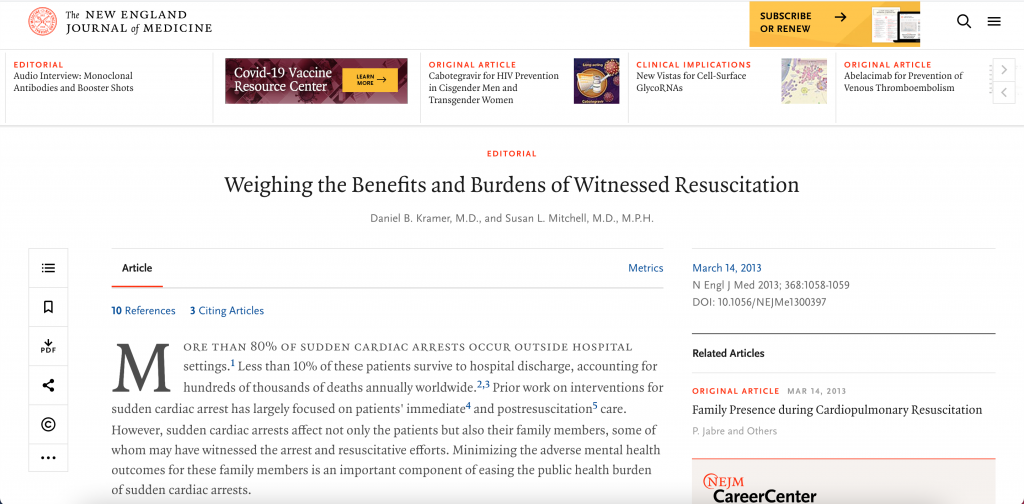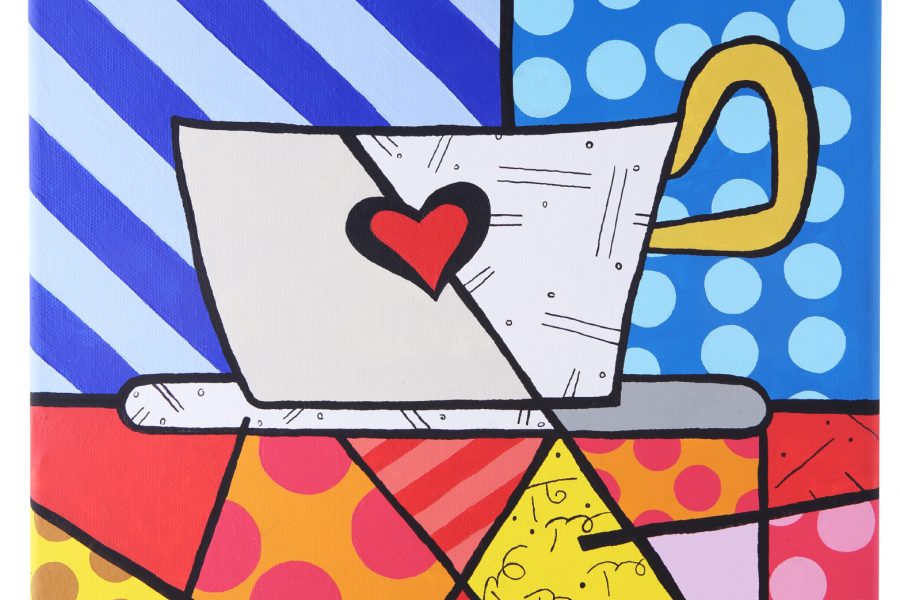By Han Ming Xuan (with thanks to Dr Jade)
Family-witnessed resuscitation
Seeing one’s own family member being subject to chest compressions, AED shocks and IV drugs can be a horrific sight. A 2019 Swiss study reported that of 101 relatives of out-of-hospital cardiac arrest, 17% reported symptoms of depression while 13% reported symptoms of anxiety, as assessed by the Hospital Anxiety Depression Scale (HADS). [1]
To see…
The topic of family-witnessed resuscitation has been controversial for years. In 2013, Doctors Kramer and Mitchell published an article in the New England Journal of Medicine that weighed the pros and cons of witnessed resuscitation. [2] An important statement was made at the beginning of the piece which must deserve mention – because sudden cardiac arrest has an impact on not only patients but also family members, minimising the negative psychological sequelae for family members is also a vital component in tackling the public health burden of cardiac arrests. [2] In other words, caring for the loved ones of cardiac arrest victims is equally important.

In their article, Doctors Kramer and Mitchell quoted a landmark French study by Jabre et al. [3] It was a prospective cluster-randomised controlled trial with 15 emergency medical services and which involved 570 family members. As with any randomised controlled trial, there is both the intervention and control group. In this case, family members of cardiac arrest victims were placed in the intervention group if they agreed to be present during resuscitation when offered the choice by the attending emergency medical team. The intervention group were accompanied by a supporting emergency crew member who also provided clinical information as the resuscitation was ongoing. The control group were family members who were not given the option to be present. [3]
It was reported that the control group (those who did not witness the resuscitation) had significantly more frequent PTSD-related symptoms than the intervention group. Surprisingly, the control group also reported a higher rate of experiencing a major depressive episode, and a significantly greater presence of complicated grief. [3] These results suggest that witnessing the resuscitation might be a protective factor against possible mental illness stemming from psychological trauma.
Or not to see…
Another qualitative study conducted on Finnish and Polish health care professionals revealed concerns about in-hospital family-witnessed CPR, from the perspective of the clinicians. [4] Five issues emerged as valid concerns:
-
- The traumatising effect of witnessing resuscitation
- Interference with the workflow of healthcare personnel
- insufficient support for the family
- Need for training of staff
- The option of family witnessed CPR should be a case-by-case instead of an across-the-board decision [4]
These points shed important light on the need to give emergency medical service personnel the sufficient space and leeway to do their best in the resuscitation. As the pre-hospital environment does not currently allow for mental health professionals to follow ambulance crew, it is important for family members to be mindful of their emotions and know when to reach out.
What goes through the mind of the family members of cardiac arrest patients?
A 2009 study by Bremer et al summed up a few things that family members of cardiac arrest victims struggle with. [5] The cardiac arrest event itself was sudden and unexpected, leaving no room for them to process the shock. This gave a sense of unreality. There were feelings of responsibility, inadequacy and even guilt, especially when the patient did not make it. The family members might blame themselves when they recall and reflect on their role in the traumatic event. Of greater significance are the feelings of hopelessness and insecurity about what to do and what to expect in the future. [5]
Having these emotions is never a sign of weakness. Being emotional is part of being human, and what’s most important of all is to talk about these feelings with people we trust.
References
[1] Metzger K, Gamp M, Tondorf T, Hochstrasser S, Becker C, Luescher T, Rasiah R, Boerlin A, Tisljar K, Emsden C, Sutter R. Depression and anxiety in relatives of out-of-hospital cardiac arrest patients: Results of a prospective observational study. Journal of critical care. 2019 Jun 1;51:57-63.
[2] Kramer DB, Mitchell SL. Weighing the benefits and burdens of witnessed resuscitation. The New England journal of medicine. 2013 Mar 14;368(11):1058.
[3] Jabre P, Tazarourte K, Azoulay E, Borron SW, Belpomme V, Jacob L, Bertrand L, Lapostolle F, Combes X, Galinski M, Pinaud V. Offering the opportunity for family to be present during cardiopulmonary resuscitation: 1-year assessment. Intensive care medicine. 2014 Jul;40(7):981-7.
[4] Sak‐Dankosky N, Andruszkiewicz P, Sherwood PR, Kvist T. Health care professionals’ concerns regarding in‐hospital family‐witnessed cardiopulmonary resuscitation implementation into clinical practice. Nursing in critical care. 2018 May;23(3):134-40.
[5] Bremer A, Dahlberg K, Sandman L. Experiencing out-of-hospital cardiac arrest: significant others’ lifeworld perspective. Qualitative Health Research. 2009 Oct;19(10):1407-20.

Motivation behind this series
Starting out as a paramedic trainee got me thinking hard about psychological well-being. For too long topics like these are shunned by lay people and healthcare professionals within and outside the fields of medicine because for some reason, being in such professions, we somehow are expected to “act the part” in the face of trauma and adversity: suck it up and move on! No denying that we are all resilient and tough individuals but a culture of not speaking up trivialises the importance of mental health.
Speaking to Dr. Jade led me to realise that even at her level of seniority, experience and standing, mindfulness and well-being are on the top of her list even as a senior paediatric emergency specialist. She inspires so many and she paves the way for more open conversations about well-being in healthcare and beyond. My gratitude goes to Dr. Jade for her unwavering support and guidance throughout the conceptualisation and writing of this series.









1 Comment
Leave your reply.